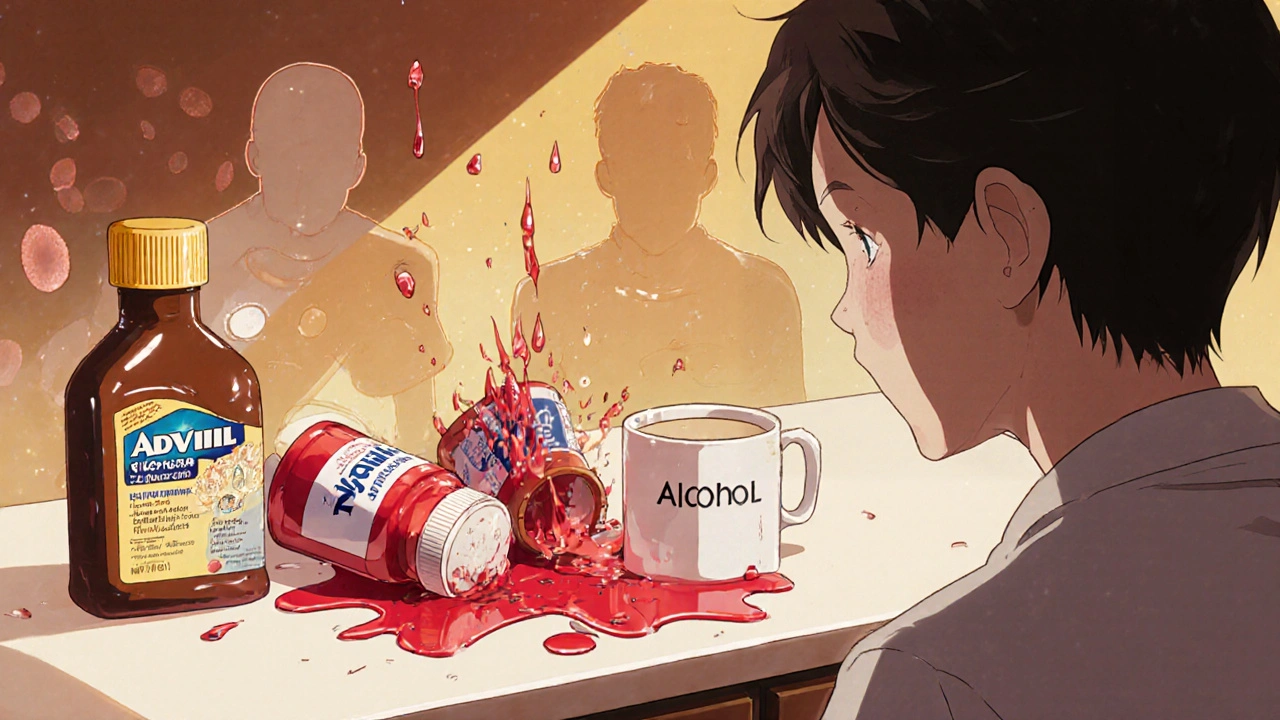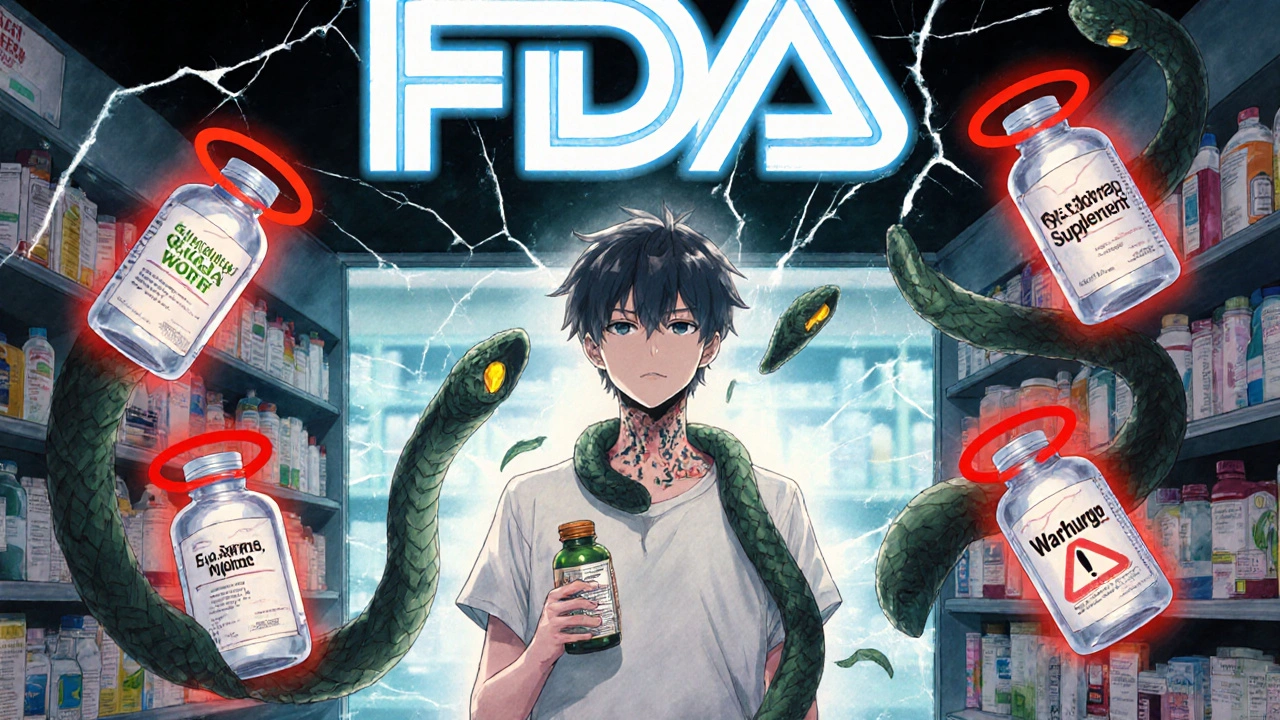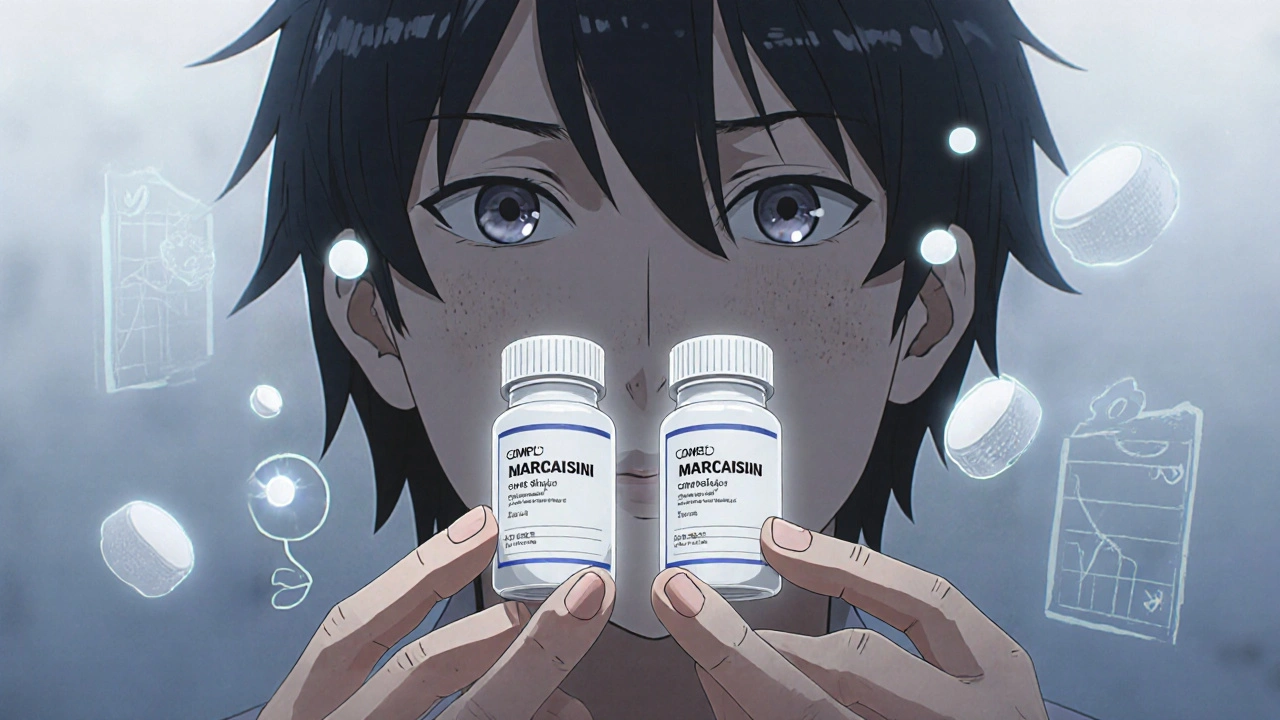Not all medicines work the same way-and not all of them come with the same risks. Whether you're taking a prescription pill, an over-the-counter painkiller, or a herbal supplement labeled "natural," each type of medication carries its own set of possible side effects. And those side effects aren't always obvious. Some show up quickly. Others creep in over weeks. Some are mild. Others can be life-threatening.
Prescription Drugs: Consistent, But Not Risk-Free
Prescription medications are the most tightly controlled. The FDA requires them to go through years of testing before they hit the market. That means we know a lot about what they can do-and what they can harm. But knowing the risks doesn't make them safer. It just makes them predictable.Take warfarin, for example. It’s a blood thinner used to prevent strokes and clots. A tiny change in how your body absorbs it can mean the difference between stopping a clot… and causing a dangerous bleed. That’s why switching from brand-name Coumadin to a generic version of warfarin isn’t just a cost-saving move-it’s a medical decision. Even though the active ingredient is identical, small differences in how the tablet breaks down in your body can affect your INR levels. That’s why doctors often recommend staying on the same generic brand once you’ve found one that works.
Same goes for levothyroxine, the drug used to treat underactive thyroid. Patients who switch between different generic versions report changes in energy, weight, and mood. Not because the medicine stopped working-but because their body got used to one formulation, and the new one absorbed slightly differently. The FDA says these differences are within acceptable limits. But for people with narrow therapeutic index (NTI) drugs like these, even 5% variation matters.
Generic vs. Brand: Same Drug, Different Fillers
Here’s something most people don’t realize: generic drugs aren’t just cheaper versions of brand-name pills. They’re identical in active ingredient, strength, and how fast they work. But the rest? That’s where things get messy.Fillers. Coatings. Dyes. Preservatives. These inactive ingredients hold the pill together or help it dissolve. And while they don’t treat your condition, they can trigger reactions. Lactose is a common filler. If you’re lactose intolerant, a generic version of your antidepressant might give you bloating and cramps-even if the brand-name version never did. The same goes for aspartame, sulfites, or soy lecithin. These aren’t listed on the box in plain language. You have to dig into the package insert or ask your pharmacist.
Studies show that for most drugs-especially blood pressure meds, statins, and antibiotics-generics work just as well as brands. One analysis of 837 patients found no meaningful difference in outcomes between brand and generic versions of beta-blockers, diuretics, or statins. But here’s the catch: 53% of medical editorials still warn against switching. That kind of doubt sticks with patients. And when you’re already feeling unwell, doubt can make side effects feel worse-even if they’re not real.
Over-the-Counter (OTC) Medications: The Hidden Risks
You don’t need a prescription for ibuprofen, acetaminophen, or antihistamines. That makes them feel safe. But they’re not harmless.Take acetaminophen. It’s in more than 600 products-from cold meds to sleep aids. Take too much, even just a little over the daily limit, and you can cause serious liver damage. No warning. No symptoms at first. Just a slow, silent injury.
And then there’s the combo problem. People take Advil for a headache, then a cold tablet that also has ibuprofen. Suddenly, they’ve doubled their dose. Or they take NyQuil for sleep, not realizing it contains acetaminophen-and they’re already taking it for back pain. These aren’t rare mistakes. They’re everyday ones.
Even "mild" OTC drugs like antihistamines can cause drowsiness, dry mouth, or confusion in older adults. And if you’re on other meds? That’s when things get dangerous. Antihistamines can clash with antidepressants, heart meds, or even some herbal supplements. No one warns you about that when you grab the bottle off the shelf.

Complementary Medicines: Natural Doesn’t Mean Safe
"Natural" is a marketing word, not a safety guarantee. Echinacea, ginkgo, St. John’s Wort-these aren’t candy. They’re powerful plant chemicals with real effects on your body.Echinacea can trigger asthma attacks, hives, or muscle aches. In rare cases, it causes swelling in the throat. And if you’re on liver-metabolized drugs-like some cholesterol meds or antidepressants-it can interfere with how they’re broken down. That means higher levels of the drug in your blood. More side effects. More risk.
St. John’s Wort is even more dangerous. It boosts serotonin. So if you’re on an SSRI like sertraline or fluoxetine, combining them can lead to serotonin syndrome. Symptoms? Tremors, high fever, rapid heartbeat, confusion. It can kill. And no one tells you this when you buy it at the health food store.
Feverfew, often taken for migraines, can cause uterine contractions. That’s why it’s a hard no for pregnant women. Ginkgo increases bleeding risk. So if you’re on warfarin, aspirin, or even fish oil, adding ginkgo could turn a minor cut into a medical emergency.
And here’s the kicker: the FDA doesn’t require these products to prove they’re safe before selling them. No clinical trials. No mandatory labeling of side effects. No oversight on how much active ingredient is actually in the bottle. You could buy two bottles of the same ginkgo supplement from different brands and get wildly different doses. One might be harmless. The other could send you to the ER.
Alcohol and Medications: A Dangerous Mix
Many people don’t realize that alcohol isn’t just a social drink-it’s a drug. And it doesn’t play nice with most medications.With antibiotics like metronidazole, alcohol can cause flushing, vomiting, and a racing heart. With painkillers like acetaminophen, it ramps up liver damage. With sedatives or antidepressants, it doubles the drowsiness. And with blood pressure meds? It can make your blood pressure drop too low, leading to dizziness or fainting.
Even if you don’t drink heavily, a glass of wine with dinner can be enough. Alcohol stays in your system for hours. So if you take your medication at night and have a drink at 8 p.m., you’re still mixing them at 1 a.m.

What You Can Do: A Simple Checklist
You don’t need to be a doctor to protect yourself. Just be smart.- Know your meds. Write down every pill, supplement, and herb you take. Include doses and why you take them.
- Check inactive ingredients. If you’re allergic to lactose, soy, or dyes, ask your pharmacist to check the filler in your generic pills.
- Don’t assume "natural" is safe. Always ask your doctor or pharmacist if a supplement interacts with your prescription meds.
- Watch for changes. If you start feeling weird after switching brands or adding a new supplement, note it. Write down when it started, what you changed, and how you feel.
- Ask about NTI drugs. If you’re on warfarin, levothyroxine, or certain seizure meds, stick with the same manufacturer. Don’t switch generics without talking to your doctor.
- Be honest about alcohol. Tell your provider how much you drink-even if you think it’s "just a little."
Side effects aren’t random. They’re predictable-if you know where to look. The problem isn’t that medicine is dangerous. It’s that we treat all of it like it’s the same. It’s not. And that difference can save your life-or end it.
Are generic drugs really the same as brand-name drugs?
Yes, in terms of active ingredient, strength, and how fast they work. The FDA requires generics to be bioequivalent-meaning they deliver the same amount of medicine into your bloodstream within a very small range. But the fillers, dyes, and coatings can be different. That’s why some people react to generics but not brands-usually because of an allergy to an inactive ingredient, not the medicine itself.
Can herbal supplements really interact with prescription medications?
Absolutely. St. John’s Wort can make antidepressants too strong, leading to serotonin syndrome. Ginkgo and garlic can increase bleeding risk when taken with blood thinners like warfarin. Echinacea can interfere with liver enzymes that break down many common drugs. These aren’t myths-they’re documented cases. Always tell your doctor what supplements you’re taking.
Why do some people have worse side effects after switching to a generic?
For most drugs, they don’t. But for narrow therapeutic index (NTI) drugs-like levothyroxine or warfarin-even tiny differences in absorption can matter. If your body was stable on one generic brand and you switch to another, your levels might shift enough to cause symptoms. That’s why doctors often recommend staying with the same generic manufacturer once you’ve found one that works.
Is it safe to take OTC painkillers with alcohol?
It depends. Mixing acetaminophen with alcohol increases your risk of liver damage-even if you’re within the daily dose limit. Ibuprofen with alcohol can cause stomach bleeding. Alcohol also makes you drowsier if you’re taking painkillers that contain sedatives. The safest answer? Avoid alcohol while taking OTC pain meds.
How do I know if a side effect is from my medicine or my illness?
It’s hard. Many symptoms-like fatigue, nausea, or skin rashes-can come from either. The best way is to track changes. Did the symptom start right after you began a new drug or changed your dose? Did it improve after stopping? Talk to your doctor and keep a journal. Sometimes, stopping the medicine (under medical supervision) is the only way to know for sure.
Should I avoid all supplements if I’m on prescription drugs?
No. But you should treat them like medicine. Just because they’re sold in health stores doesn’t mean they’re harmless. Always ask your pharmacist or doctor before starting any new supplement. Some-like vitamin D or calcium-are generally safe. Others-like St. John’s Wort, ginkgo, or kava-carry serious risks when mixed with common prescriptions.


Wow, this is one of the most thorough breakdowns of medication risks I've ever read. Seriously, people need to understand that 'generic' doesn't mean 'identical'-especially when you're on something like levothyroxine. I switched generics once, and my TSH went haywire for three weeks. My doctor didn't even think it was the pill-until I insisted. Now I stick with the same brand, no matter the cost. And yes, the fillers? Real issue. I'm lactose intolerant, and I once had a generic antidepressant that turned me into a bloated, gassy mess. The brand? Zero problems. Always check the inactive ingredients. Pharmacies have the full list-ask for it.
Man, this post is a godsend. I’ve been telling my cousins in Delhi for years: ‘natural’ doesn’t mean ‘no side effects.’ My uncle took St. John’s Wort for his ‘low mood’-and ended up in the ER with serotonin syndrome because he was also on fluoxetine. No one warned him. The pharmacy just handed it over like it was turmeric powder. And don’t get me started on ginkgo and warfarin-people think it’s ‘just a herbal tea’ until they start bleeding out of their gums. We need more education, not just more pills. Maybe community health sessions? At least in the local markets, someone should put up posters: ‘Herbs Can Kill Too.’
Stop scaring people. Everything has side effects. Even water. You're just overcomplicating this. I take generic anything and never had an issue. Stop being paranoid.
Bro, I used to think the same as the last guy-until my mom switched generics for her blood pressure med. She started getting dizzy, couldn’t focus, felt like she was underwater. We thought it was aging. Turns out, the new generic had a different coating that slowed absorption. Took her 2 weeks to stabilize back on the old one. And yeah, the lactose thing? Real. My aunt broke out in hives from a generic ibuprofen. The label didn’t say ‘lactose’-it said ‘starch.’ We had to Google the chemical name to find out it was milk sugar. Don’t trust the front of the box. Always dig.
I appreciate how this post doesn’t just say ‘avoid everything’-it says ‘know what you’re doing.’ That’s the real message. Medicine isn’t magic. It’s chemistry. And chemistry doesn’t care if you call it ‘natural’ or ‘prescription.’ It just reacts. I’ve seen friends get scared of all meds because of horror stories, and others ignore everything because ‘it’s just a pill.’ Neither extreme helps. The middle path? Track. Ask. Listen to your body. And if you’re unsure? Talk to your pharmacist. They’re the unsung heroes who actually read the tiny print. Don’t just walk out with a bottle-walk out with awareness.
I’m so glad someone finally said this. I’ve been on warfarin for 8 years. I used to switch generics because insurance changed. Then I started getting nosebleeds every week. My cardiologist was like, ‘Did you change your pill?’ I didn’t even think to check. Now I only take the one with the blue stripe. And yes, I know the name of every filler. I carry a printed list. It’s annoying. But I’m alive. So yeah. This isn’t fear-mongering. It’s survival.
lol so basically if u r on meds u gotta be a chemist AND a detective? smh. i just take my pills and hope for the best. also st johns wort? sounds like something my grandma brewed in her basement. who even uses that anymore?
The data supporting bioequivalence in generic medications is robust. However, pharmacokinetic variability in narrow therapeutic index drugs remains a clinically significant concern. Patients should be counseled on consistency in manufacturer selection, particularly for anticoagulants and thyroid hormone replacements. Non-pharmaceutical excipients may also contribute to adverse events in sensitive populations.
You’re not alone in feeling overwhelmed. I used to be scared of every side effect too-until I started keeping a simple journal. Just one line a day: ‘Took pill? How do I feel?’ After a week, patterns showed up. I realized my headaches started after I added ginkgo. I stopped it. Boom. Headaches gone. You don’t need to be an expert. You just need to pay attention. And if you’re unsure? Ask your pharmacist. They love helping people like you. Seriously. They’re not just the people behind the counter-they’re your safety net.
Okay but like… how many people actually read the package insert? I mean, I’ve been on 5 different generics and never checked. And I’m still here. Maybe the system works fine and we’re just overthinking it? I don’t know. I just take the pill. And if I feel weird? I stop. Easy.